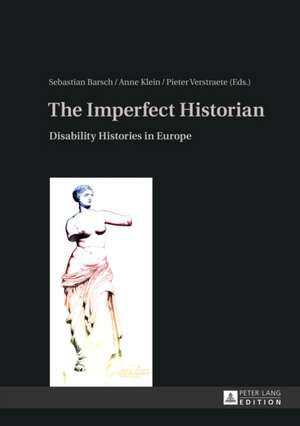The Imperfect Historian
Editat de Sebastian Barsch, Anne Klein, Pieter Verstraeteen Limba Engleză Hardback – 28 mai 2013
Preț: 336.44 lei
Nou
Puncte Express: 505
Preț estimativ în valută:
64.39€ • 66.97$ • 53.15£
64.39€ • 66.97$ • 53.15£
Carte indisponibilă temporar
Doresc să fiu notificat când acest titlu va fi disponibil:
Se trimite...
Preluare comenzi: 021 569.72.76
Specificații
ISBN-13: 9783631636596
ISBN-10: 3631636598
Pagini: 280
Ilustrații: Illustrations
Dimensiuni: 150 x 208 x 23 mm
Greutate: 0.5 kg
Ediția:Revised
Editura: Peter Lang Gmbh, Internationaler Verlag Der W
ISBN-10: 3631636598
Pagini: 280
Ilustrații: Illustrations
Dimensiuni: 150 x 208 x 23 mm
Greutate: 0.5 kg
Ediția:Revised
Editura: Peter Lang Gmbh, Internationaler Verlag Der W
Notă biografică
Sebastian Barsch is post-doctoral researcher at the University of Cologne (Germany). Anne Klein is lecturer/researcher at the University of Cologne and the Friedrich-Ebert-Stiftung, Bonn (Germany). Pieter Verstraete is assistant professor for the History of Education at the Katholieke Universeit Leuven (Belgium). Next to other research in history they share an interest in the history of disability, power and identity.
Cuprins
Contents: Sebastian Barsch/Anne Klein/Pieter Verstraete: The need for imperfection: Disability histories in Europe - Peter Horn/Bianca Frohne: On the fluidity of 'disability' in Medieval and Early Modern societies. Opportunities and strategies in a new field of research - Patrick Schmidt: No need for assimilation? Narratives about disabled persons and their social integration in eighteenth-century periodicals - Paul van Trigt: The imperfection of narrative: Sensory history and the inclusion of blind people in Dutch society in the twentieth century - Annemieke van Drenth: Care and curiosity: Ida Frye and the first boy with autism in the 1930s in the Netherlands - David Leenen: Governing the cripple(s) - Hilary Malatino: Queer monsters: Foucault, «hermaphroditism» and disability studies - Gildas Bregain: An entangled perspective on disability history: The disability protests in Argentina, Brazil and Spain, 1968-1982 - Sebastian Barsch: The globalisation of disability: Rise and fall of Facilitated Communication in Germany - Gaby Admon-Rick: The rise of percentages: Encrypting disabled bodies in British Mandate Palestine and Israel, 1930-1956 - José Martínez Pérez/Mercedes Del Cura: Work injuries, scientific management and the production of disabled bodies in Spain, 1920-1936 - Jitka Sinecka: Peeping over the wall: Communism, Goffman and the deinstitutionalisation of people with autism in the Czech Republic - Anna Piotrowska: Disabled musicians and musicology - Pieter Verstraete: HIV/AIDS and disability history - Anne Klein: From biopolitics to ethics of disability: Voices on decolonisation and anti-psychiatry in France, 1945-1975 - Henri-Jacques Stiker: Disability history for the Twenty-First Century.
